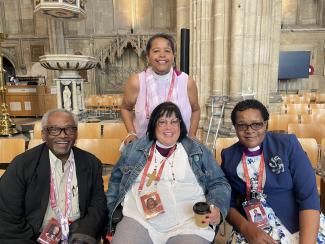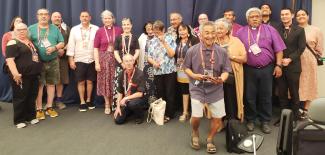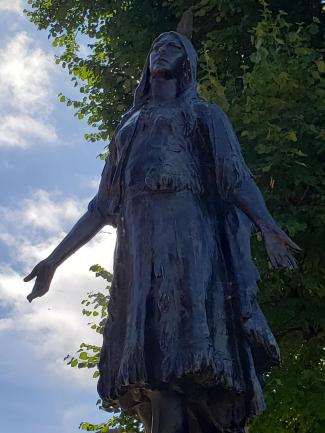From July 26 to Aug. 8, Diocese of Massachusetts Bishop Suffragan Gayle E. Harris and Bishop Carol J. Gallagher, who serves as a regional canon in the diocese, participated in the once-a-decade Lambeth Conference of some 650 bishops from across the Anglican Communion, convened by the archbishop of Canterbury. (Bishop Alan M. Gates did not attend; read his July 29 statement.)
In a recent interview with Director of Communications Tracy Sukraw, Harris and Gallagher reflected together on their experience at--and exclusion from--Lambeth when it last met in 2008; where and how they found Jesus present at Lambeth this time around; and their side-trip pilgrimages to Gravesend and Turville. The conversation has been edited for length and reading ease.
Find Episcopal News Service's Lambeth coverage here.
For those who do not know, every 10 years, usually, the archbishop of Canterbury convenes the bishops of the Anglican Communion for the Lambeth Conference, and this time around, it was happening in the context of a pandemic delay and various controversies, including, first, when spouses of bishops in same-sex marriages were not invited, and then the surprising release of an initial draft of "Calls," in lieu of resolutions, that included an attempt to reaffirm a prior Lambeth resolution against same-sex marriage. Given all that, why did you feel it was important to go to the Lambeth Conference this year?
Bishop Gayle Harris: Attending this particular one was important for me because when I went in 2008 I was the only woman of color. It was at points painful and at other points frustrating because a lot of animosity was leveled at me in looks and in my being invisible to people at times. I knew that given controversy around LGBTQ ordination and marriage that I needed to go and stand up with those who were facing what I faced as a woman of color. [In 2008] I was pretty isolated and some of my brother bishops came to my aid and stood with me and took me out to dinner and had fellowship with me, and I wanted to do the same thing for my LGBTQ sisters and brothers throughout the Anglican Communion. I wanted to stand with them to be a companion, to be someone of support but also encouragement.
Bishop Carol Gallagher: I was not allowed to go to the last one. It's a complicated story and tragic in some senses. I was a bishop. I was active. Even though I was assisting bishop in North Dakota, because I wasn't full time, and other barriers that were put up, I wasn't allowed to go. In fact, Gayle had to take my place because I had been asked to lead Evensong. At that point, I was the only Indigenous woman bishop.
Bishop Harris: First and only.
Bishop Gallagher: First and only. So that exclusion. At least Gayle and I could have gone together as women of color, so for both of us it was really a difficult time, staying behind and her having to sort of hold the banner. There's a lot of good comaraderie [at Lambeth] but there's also some very rough criticism that is pretty intense. It's gotten a lot better, but at that time we were only a few years after [first openly gay bishop] Gene Robinson's consecration and we as a church were really shunned for lots of different reasons.
Bishop Harris: It was partially Gene Robinson's consecration and also women's ordination. It was also that, while in the United States we have a separation between church and state, that's not true throughout the Anglican Communion, so our U.S. foreign policy, the U.S. withholding support and financial aid to certain parts of the Global South at that time, that's also part of the animosity we received from other parts of the Anglican Communion.
Bishop Gallagher: There's a lot of assumptions made about how leadership is appointed. In The Episcopal Church we don't appoint bishops. We elect. But that doesn't happen in most of the rest of the Anglican Communion, and so that's always confusing and sometimes controversial.
What is Lambeth, at its best, and what is it not?
Bishop Harris: I am glad for what it is not. It is not a governing body. It is not a legislative body. It is an opportunity to network, to have fellowship, to talk about and become informed about the big issues facing not just the church but the world, and to hear the stories of Christians who are in different circumstances, to know that sometimes discipleship is costly. It's a chance for us to see the totality of the expression of the Anglican churches throughout the world.
Bishop Gallagher: Part of the time we were there was a retreat, and we worshiped together not just during the retreat but also daily. We had two big festal services at the beginning and the end, and in between there was daily prayer led by a variety of different churches around the world. We got to see a breadth of ideas, ministries, missions that we might not have been exposed to. There were workshops every day. And as a relational piece, Archbishop of Canterbury Justin Welby listened to various parts of the church, including a meeting with the Indigenous bishops from Canada, New Zealand, South America, and it was quite an incredible gathering. He wanted to listen and know some of the situations we face. And he did this with a variety of groups. So I think that there was a really healthy, lively exchange and some very surprising exchanges, and in the informal gatherings, particularly our Bible study groups. Several of the people in my Bible study group were under such political and governmental restrictions where they are church, and that really opened my eyes to both how fortunate we are but also how challenging it is to be church in a lot of places.
What perspective did you bring to Lambeth from our Massachusetts context?
Bishop Gallagher: I think we as a diocese are incredibly inclusive, particularly with our LGBTQ folks, in clergy roles, in leadership roles, in same-sex blessing and marriage. I think we bring a level-headedness about that. The issues of talking about racism, I think we bring that as somewhat of a gift; at the same time, I think we have a lot to learn globally from some of our church partners about the work that they have been doing about their own colonialism, which is a big issue. We don't talk about colonialism in this country, but we are a colonial church. We haven't had the conversation about colonialism, so I think that invitation was very clear, including from those parts of the church that are really living out the challenges of what we have done in terms of not caring for creation, those of us who have been polluting and destroying, face-to-face with those people who are suffering the consequences of that.
Bishop Harris: I think so often, as it is in this country, vision or points of view and experiences can turn a person who is in a different situation or who opposes your views into an "issue." I think part of it is saying: I'm a person. I am not an issue. I'm not a situation or circumstance.
Bishop Gallagher: You're not a problem either. I mean, we've heard a lot of bad press about various different bishops and various different places and a lot of it is just bad press. A lot of it is just angry words or things taken out of context when, in fact, we're all human beings. You know, when you sit and eat with folks for eight straight days, they become more fully human with all the same foibles we have. It is being able to see those things that join us together rather than divide us.
Bishop Harris: At my table there was a leader of the Global South who was there in protest, and one of the things I was able to say was: Is Jesus present? Can we start talking about what we agree about rather than what we disagree about? Can we start there first? That's part of our perspective coming out of Massachusetts, which is diverse and has different points of view, that we have to find some commonality and not just focus on the differences.
I'll turn that question back to the two of you: Where did you see Jesus present while you were at Lambeth?
Bishop Harris: In breaking bread and in laughter.
Bishop Gallagher: I think it was really at various different tables, those moments when you're just walking and talking with folks, those moments when you're sitting over a meal or a cup of coffee, those simple conversations and small encounters.
Bishop Harris: I think also, of course, Jesus was present in worship, and what probably broke Jesus' heart is when bishops of the Global South refused to take Communion and would only participate by saying the Lord's Prayer. And yet, we did not stop celebrating Christ amongst us even in that moment. And it was a hard moment. They did come, they did sit in the service. And that gives hope.
Bishop Gallagher: They were in the same room with us.
Bishop Harris: I thought it was also a Jesus moment, and this is a big one for me, when it came to the time of talking about human dignity--meaning human sexuality--and Archbishop Welby, who previously we were not clear on where he was on the issue, especially with the disinviting of the spouses in same-sex marriages, got up and said that we have always disagreed about things, and we're going to disagree about human sexuality, but that he did not have or seek the authority to discipline or exclude a province of the Anglican Communion because of this. That was a powerful moment.
Were there particular issues or concerns that you were most hoping to engage with your colleagues about?
Bishop Harris: Lambeth spent a whole day dealing with climate change. One of the bishops at my table was from Melanesia where there had just been a category five hurricane, and he was told by his people, you have to go and tell our story about how the climate has changed and islands may be under the ocean in a few decades. I think that issue is something that gathers all of us, as well as war and violence. We prayed a lot about what was going to happen in Kenya after the presidential election there. To have the archbishop of Jerusalem talk about not only Christian unity but what it is to live in a system where his own people are not fully citizens in so many ways. So we had a wider perspective, I think, with people there who were going through issues.
Is there something you brought home from Lambeth? A new insight or question on your heart or story that you feel motivated to share as a result of your experience?
Bishop Harris: Well, I didn't get COVID, as some did!
Bishop Gallagher: I didn't either, but I came home in a boot. My first night at Lambeth I stepped up into the loo, as they call it, to put some things away and my right Achilles tendon just snapped. And so I was in a boot with crutches, and in a wheelchair getting pushed around. I've got to say a couple of things about that. The kindness of some of the staff of the conference and the EMTs that took care of us that were compassionate, listened, were funny, down to earth.
One of the things I take home is a deeper understanding that I can't know what somebody else's experience is unless I have a conversation with them, unless I listen to them. I had two bishops from South Sudan come up to me when I was in the wheelchair. They wanted to take pictures with me so they could prove to their people that folks could be leaders in the church even if they had challenges. That brought me to tears. That little vignette reminded me that I have no idea what people are going through or what their perspective is, or what they need to learn or what I need to learn. That was really powerful, moments like that, people who really were helpful and taught me something I didn't expect to learn. Like the Church of South India: I didn't know that it is now illegal for them to baptize anybody, to marry anybody, to conduct the sacraments of the church, and if they do so, they can be put in jail. I came home with a real sense of how really rich and blessed we are and how much whining we do when we have no right. Is that a good way to say it, Gayle?
Bishop Harris: We so worry about our own position, our own power within a congregation or a diocese. We should not have that place in our heart closed off such that we are so worried about our own that we do not see what is happening around the world to other Christians. I find it deplorable that we focus on such small things when people are making life or death decisions about following Jesus.
Bishop Gallagher: One of the things that we did--and I really appreciated Gayle taking me--we went to Gravesend, which is where Pocahontas--Matoaka--is said to be buried. There's a monument there, and for me it's an important shrine. To sort of stand in that place and think about how people have suffered. And she was a Christian woman. So.
Bishop Harris [laughing]: We did another pilgrimage that day.
Bishop Gallagher [also laughing]: You have to understand how important this is to Gayle and me particularly. We went to visit St. Mary the Virgin in Turville, which is the setting used for [the British sitcom] "The Vicar of Dibley." It is now--this is a story to tell all the parishes of this diocese--it is now a church that is clustered with other parishes. The church across the world, including ours and in other places, are having to think about how they're going to do ministry together instead of as single parishes all by themselves. That day we had the place to ourselves.
Bishop Harris: Carol found on her phone Howard Goodall's setting of the Psalm 23, and we sat there looking at the church, nobody around us but the birds, and we played it out loud.
There's a question I asked you, Bishop Gayle, in an interview after Lambeth 2008 that I'll ask again of both of you: Did you learn anything new about your role as a bishop?
Bishop Gallagher: I think if anything I learned that it's so easy for me to get hyper focused on the small stuff, and particularly the things that are just frustrating, and yet, you know, it's really an opportunity as a bishop to not only love people wherever they are but also to help them see the bigger picture instead of just focusing on the minutiae, focusing on the finances, or the lack of having a priest, but also helping people have a bigger vision and realizing that their capacity is enriched by the rest of the church's capacity and people in their neighborhood and things like that. Maybe that was just reinforced, but I think that is something I take away from Lambeth.
Bishop Harris: We seem to be caught up in scarcity as an identity, but yet when you go to Lambeth you see people's love of Jesus, many of whom have very little materially and yet they are willing to talk about their faith. We have got to get over ourselves and get with Jesus. I came back with that yet again. It's not about you. It's not about me. It's about Jesus. We need to share that story of hope and love to the world, and especially in this country.
Bishop Gallagher: We can get very exhausted by the responsibilities that we have, yet for people we encountered who have to rely completely on Jesus, they just modeled a willingness to live in hope and be joyful, and I took that away too. To have, for us and all the bishops, their faith deepened and renewed--and challenged, too, maybe--Lambeth is worth that alone.
Bishop Harris: It's that old hymn: "Hallelujah! Thine the glory, hallelujah! Amen! Hallelujah! Thine the glory, revive us again." We have been revived in our spirit.




